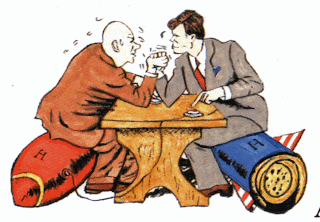Whose to blame for the Cold War?
After World War 2, the U.S and USSR become the worlds leading superpowers. Although both countries are extremely powerful the two countries are very different. The U.S runs under a capitalistic system where as Russia runs under a system known as communism. These are two very different ways of living where one values the individual over the state and vise versa. Over time, this caused a series of conflicts and tension between the U.S and USSR. The period is known as the Cold war. The USSR and U.S both take part in this but who is to blame for this tension between superpowers? The USSR is primarily responsible for the Cold war because of the enormous amount of tension contributed from Stalin's foreign expansion policies.
Stalin had a plan to take advantage of post war Europe and that plan was succeeding. He had a victory in gaining the territories of Poland and Romania. Stalin wanted to expand his country and communism. The U.S percieved this as a threat creating tension between the two superpowers. If it weren't for Stalin's aggression the cold war itself could have been avoided. U.S would have never been forced to intiate the Marshall plan and Truman Doctrine if it weren't for Stalin's untapped will for power and expansion.
When one matches up the leaders at the start of the Cold War its easy to see who would be the blame for a war that lasted over forty years. Joseph Stalin was a power hungry individual who wanted nothing more than to see his nation prevail. He would do whatever he had to do so that communism expands. In this war, the U.S did everything they needed to do to limit Stalin. The cold war started because of Stalin's reckless drive for power.
Citations
“Who Was Responsible for the Cold War?” UKEssays, www.ukessays.com/essays/history/who-was-responsible-for-the-cold-war-history-essay.php.
“Who Was Responsible for the Cold War?” UKEssays, www.ukessays.com/essays/history/who-was-responsible-for-the-cold-war-history-essay.php.

Comments
Post a Comment